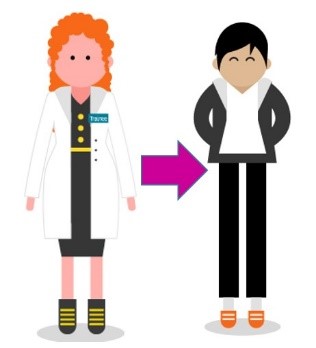Case Study / Case Report / Case Series
Some famous examples of case studies are John Martin Marlow’s case study on Phineas Gage (the man who had a railway spike through his head) and Sigmund Freud’s case studies, Little Hans and The Rat Man. Case studies are widely used in psychology to provide insight into unusual conditions.
A case study, also known as a case report, is an in depth or intensive study of a single individual or specific group, while a case series is a grouping of similar case studies / case reports together.
A case study / case report can be used in the following instances:
- where there is atypical or abnormal behaviour or development
- an unexplained outcome to treatment
- an emerging disease or condition
The stages of a Case Study / Case Report / Case Series


Which clinical questions does Case Study / Case Report / Case Series best answer?
Emerging conditions, adverse reactions to treatments, atypical / abnormal behaviour, new programs or methods of treatment – all of these can be answered with case studies /case reports / case series. They are generally descriptive studies based on qualitative data e.g. observations, interviews, questionnaires, diaries, personal notes or clinical notes.
What are the advantages and disadvantages to consider when using Case Studies/ Case Reports and Case Series ?
| Advantages |
|
| Disadvantages |
|
What are the pitfalls to look for?
One pitfall that has occurred in some case studies is where two common conditions/treatments have been linked together with no comprehensive data backing up the conclusion. A hypothetical example could be where high rates of the common cold were associated with suicide when the cohort also suffered from depression.
Critical appraisal tools
To assist with critically appraising Case studies / Case reports / Case series there are some tools / checklists you can use.
Real World Examples
Some Psychology case study / case report / case series examples
Capp, G. (2015). Our community, our schools: A case study of program design for school-based mental health services. Children & Schools, 37(4), 241–248.
A pilot program to improve school based mental health services was instigated in one elementary school and one middle / high school. The case study followed the program from development through to implementation, documenting each step of the process.
Cowdrey, F. A. & Walz, L. (2015). Exposure therapy for fear of spiders in an adult with learning disabilities: A case report. British Journal of Learning Disabilities, 43(1), 75–82.
One person was studied who had completed a pre- intervention and post- intervention questionnaire. From the results of this data the exposure therapy intervention was found to be effective in reducing the phobia. This case report highlighted a therapy that could be used to assist people with learning disabilities who also suffered from phobias.
Li, H. X., He, L., Zhang, C. C., Eisinger, R., Pan, Y. X., Wang, T., . . . Li, D. Y. (2019). Deep brain stimulation in post‐traumatic dystonia: A case series study. CNS Neuroscience & Therapeutics. 1-8.
Five patients were included in the case series, all with the same condition. They all received deep brain stimulation but not in the same area of the brain. Baseline and last follow up visit were assessed with the same rating scale.
References and Further Reading
Greenhalgh, T. (2014). How to read a paper: the basics of evidence-based medicine. (5th ed.). New York: Wiley.
Heale, R. & Twycross, A. (2018). What is a case study? Evidence Based Nursing, 21(1), 7-8.
Himmelfarb Health Sciences Library. (2019). Study design 101: case report. Retrieved from https://himmelfarb.gwu.edu/tutorials/studydesign101/casereports.cfm
Hoffmann T., Bennett S., Mar C. D. (2017). Evidence-based practice across the health professions. Chatswood, NSW: Elsevier.
Robinson, O. C., & McAdams, D. P. (2015). Four functional roles for case studies in emerging adulthood research. Emerging Adulthood, 3(6), 413-420.